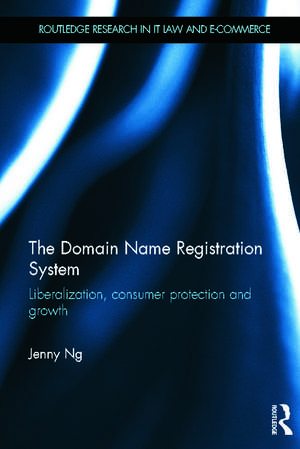The Domain Name Registration System: Liberalisation, Consumer Protection and Growth: Routledge Research in Information Technology and E-Commerce Law
Autor JENNY NGen Limba Engleză Hardback – 27 iul 2012
Preț: 274.66 lei
Preț vechi: 327.62 lei
-16% Nou
Puncte Express: 412
Preț estimativ în valută:
52.56€ • 54.67$ • 43.39£
52.56€ • 54.67$ • 43.39£
Carte tipărită la comandă
Livrare economică 15-29 aprilie
Preluare comenzi: 021 569.72.76
Specificații
ISBN-13: 9780415668132
ISBN-10: 0415668131
Pagini: 216
Dimensiuni: 156 x 234 x 18 mm
Greutate: 0.56 kg
Ediția:1
Editura: Taylor & Francis
Colecția Routledge
Seria Routledge Research in Information Technology and E-Commerce Law
Locul publicării:Oxford, United Kingdom
ISBN-10: 0415668131
Pagini: 216
Dimensiuni: 156 x 234 x 18 mm
Greutate: 0.56 kg
Ediția:1
Editura: Taylor & Francis
Colecția Routledge
Seria Routledge Research in Information Technology and E-Commerce Law
Locul publicării:Oxford, United Kingdom
Public țintă
PostgraduateCuprins
1. Liberalization, Consumer Protection and Growth - the tug and pull relationship in the domain name registration system 2. The Domain Name Registration System – An Overview 3. Domain Name Registration Systems in OECD Countries: Surveys, Illustrations and Analysis 4. Comparative Analysis – Abusive Registrations 5. Comparative Analysis – Problems of Competing Legitimate Interests 6. Comparative Analysis – Promoting Growth in the Number of Domain Name Registrations 7. Tugging and Pulling
Descriere
This book offers a comparative analysis of the domain name registration systems in Australia and the United Kingdom. It analyses global trends and international perspectives of domain name registration systems and the dynamics in the respective domain name systems.
Jenny Ng also examines the legal and economic implications of these regulatory frameworks, drawing upon economic theory, regulatory and systems theory as well as legal analysis and comparison of regulatory frameworks. In doing so, the work puts forward ways in which such systems could be better designed to reflect the needs of the specific circumstances in individual jurisdictions.
Jenny Ng also examines the legal and economic implications of these regulatory frameworks, drawing upon economic theory, regulatory and systems theory as well as legal analysis and comparison of regulatory frameworks. In doing so, the work puts forward ways in which such systems could be better designed to reflect the needs of the specific circumstances in individual jurisdictions.































